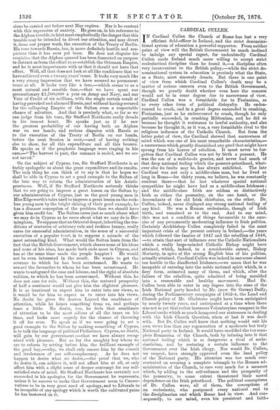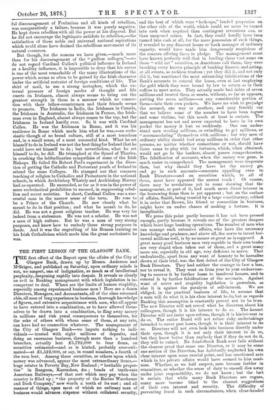CARDINAL CITLLEN.
TN Cardinal Cullen the Church of Rome has lost a very I efficient field-officer in Ireland, and the strict denomina- tional system of education a powerful supporter. From neither point of view will the British Government be much .inclined to indulge any special regret, for undoubtedly Cardinal Cullen made Ireland much more willing to accept strict ecclesiastical discipline than he found it,—a discipline often very inconvenient to the British policy,—while the strict de- nominational system in education is precisely what the State, as a State, most sincerely dreads. But there is one point of view from which Cardinal Cullen's death may be a matter of serious concern even to the British Government, though we greatly doubt whether even here the concern would not be in some degree due to narrowness of view. Cardinal Cullen was a formidable foe to Fenianism, as to every other form of political disloyalty. He endea- voured to crush, and in a great degree succeeded in crushing, Fenianism, just as he endeavoured to crush, though lie only partially succeeded, in crushing Ribbonism, and he did so because he thought it resistance to lawful authority, and also because he thought it, as it was, a very formidable rival to the religious influence of the Catholic Church. But from the latter point of view, the Cardinal showed that narrowness of mind which was one of his most remarkable characteristics,— a narrowness which greatly diminished any good that might have sprung from his horror of rebellion. It must never be for- gotten that Cardinal Cullen was not by birth a peasant. He was the son of a well-to-do grazier, and never had much of that deep national feeling which the peasant-priesthood, what- ever else its faults may be, has always exhibited. The late Cardinal was not only a middle-class man, but he lived so long in Rome—for thirty years, we believe, he was constantly resident there—that he lost whatever special national sympathies he might have had as a middle-class Irishman ; and the middle-class Irish are seldom so distinctively Irish as either the peasantry, on the one hand, or the descendants of the old Irish chieftains, on the other. Dr. Cullen, indeed, never displayed any strong national feeling of any kind. He was a Roman ecclesiastic, though of Irish birth, and remained so to the end. And to our mind, this was not a condition of things favourable to the exer- cise of any permanently moderating influence in Irish politics. Certainly Archbishop Cullen completely failed in the most important crisis of the present century in Ireland,—the years which followed the famine of 1847 and the rebellion of 1848, —to attain that sort of influence over the Catholic Nationalists which a really large-minded Catholic Bishop might have attained, which, indeed, to a considerable extent, Bishop Moriarty, in spite of the strong English bias of his polities, actually attained. Cardinal Cullen was indeed in one sense almost too hostile to the disaffected Irishmen,—we mean that he was incapable of entering into the noble national spirit which, in a fiery form, animated many of them, and which, after the failure of the rebellion, quite admitted of being moulded into a reasonable and healthy movement. Had Dr. Cullen been able to enter in any degree into the aims of the Irish National party headed by Mr. (now Sir Gavan) Duffy, during the Parliamentary campaigns of 1852-4, the Land and Church policy of Mr. Gladstone might have been anticipated by nearly twenty years, and anticipated at a time when there was not as yet that rather insensate Voluntaryism rampant in the Liberal ranks which so much hampered our statesmen in dealing with the Irish Church Question, when at last it was dealt with. But Dr. Cullen well knew that nothing would suit his own views less than any regeneration of a moderate but truly National party in Ireland. It would have modified the too com- plete Romanism of the Church, both by infusing into it that national feeling which is so dangerous a rival of eccle- siasticism, and by restoring a certain influence to the Government over the Irish clergy. Nor would Dr. Cullen, we suspect, have strongly approved even the land policy of the National party. His attention was too much con- centrated on securing a complete triumph to the Roman ad- ministration of the Church, to care very much for a measure which, by adding to the self-reliance and the prosperity of the peasantry, to some extent threatened their moral dependence on the Irish priesthood. The political conceptions of Dr. Cullen were, all of them, the conceptions of an ecclesiastic, who postponed every national end to the disciplinarian end which Rome had in view. And con- , sequently, to our mind, even his persistent and faith- ful discouragement of Fenianism and all kinds of rebellion, was comparatively a failure, because it was purely negative. He kept down rebellion with all the power at his disposal. But. he did not encourage the legitimate antidote to rebellion,—the satisfaction of those noble and universal national aspirations which could alone have drained the rebellious movement of its natural resources.
But though, for the reasons we have given,—much more than for his discouragement of the "godless colleges,"—we do not regard Cardinal Cullen's political influence in Ireland as a healthy influence, it is impossible to deny that his career is one of the most remarkable of the many illustrations of the power which seems so often to be gained by the Irish character under the artificial restraint of foreign conditions of life. The shirt of mail, to use a strong metaphor, which the ex- ternal pressure of foreign modes of thought and life exerts on Irishmen, almost always seems to bring out the greatest strength in them in a manner which no connec- tion with their fellow-countrymen and their friends seems to promote. The Irishman in India, the Irishman in Canada, the Irishman in Australia, the Irishman in France, the Irish- man even in England, almost always comes to the top, but the Irishman in Ireland hardly ever. So it was with Cardinal Cullen. He was the Irishman in Rome, and it was his residence in Rome which made him what he was,—an eccle- siastic though of no broad culture, still of a most tenacious and, in a small sense, of a most successful kind. What he set himself to do in Ireland was not the best thing for Ireland that he could have set himself to do ; but nevertheless, what he set himself to do, he did. He triumphed at the Synod of Thurles, in crushing the latitudinarian sympathies of some of the Irish Bishops. He foiled Sir Robert Peel's experiment in the direc- tion of getting the Catholic and Protestant youth of Ireland to attend the same Colleges. He stamped out that common teaching of religion to Catholics and Protestants in the national schools, in which Archbishop Whately and Archbishop Murray had co-operated. He succeeded, so far as it was in the power of mere ecclesiastical prohibition to succeed, in suppressing rebel- lion and secret societies. In short, Cardinal Cullen was a suc- cessful man in the narrow sense of the term. He rose to be. a Prince of the Church. He saw clearly what he meant to do in that position ; and what he meant to do, he did. He was not a great religious teacher. He was very far indeed from a statesman. He was not a scholar. He was not a man of high culture. But he was a man of very strong purposes, and knew how to embody those strong purposes in deeds. And it was the engrafting of his Roman training on his Irish. Catholicism which made him the great ecclesiastic he was.



































 Previous page
Previous page